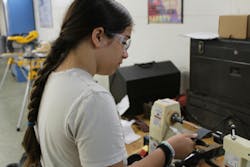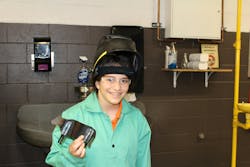Case in point: to say my daughter and her best friend loved this program is an understatement. They both came home excited to share what they learned each day at camp. My daughter has particularly developed a love of welding and soldering to the point she’s asked for her own equipment. She’s extremely proud of her newfound skills, and the camp director even dubbed her a “natural” as she maneuvered every tool handed to her with ease.
About the Author
Amanda Joshi
Managing Editor
Amanda Joshi has more than 18 years of experience in business-to-business publishing for both print and digital content. Before joining Chemical Processing, she worked with Manufacturing.net and Electrical Contracting Products. She’s a versatile, award-winning editor with experience in writing and editing technical content, executing marketing strategy, developing new products, attending industry events and developing customer relationships.
Amanda graduated from Northern Illinois University in 2001 with a B.A. in English and has been an English teacher. She lives in the Chicago suburbs with her husband and daughter, and their mini Aussiedoodle, Riley. In her rare spare time, she enjoys reading, tackling DIY projects, and horseback riding.




